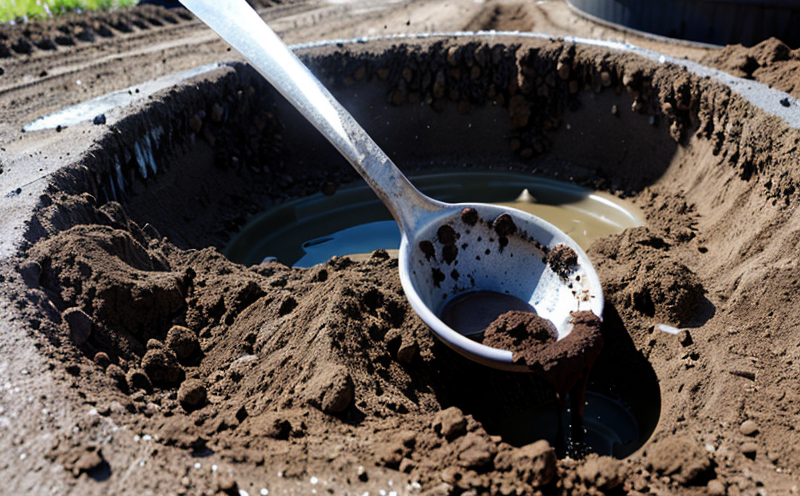EPA 1682 Salmonella in Biosolids Test
The EPA 1682 Salmonella in Biosolids Test is a critical analytical procedure used to determine the presence of Salmonella spp. within biosolids, which are organic materials resulting from wastewater treatment processes. This test holds significant importance for environmental and public health safety by ensuring that these materials do not pose risks when reused as soil amendments or fertilizers.
Biosolids, if improperly managed, can lead to the spread of harmful pathogens into the environment, which in turn may affect agricultural crops, water sources, and human health. The EPA 1682 test is essential for ensuring that biosolids meet regulatory standards set forth by environmental protection agencies worldwide.
The testing process involves several key steps: sample collection from designated sites where biosolids are stored or applied; preparation of the samples in a manner compliant with EPA guidelines; inoculation of these samples with a selective culture medium designed to inhibit non-Salmonella organisms and promote growth of Salmonella spp.; incubation under controlled conditions; final identification through biochemical tests, serotyping, or genetic analysis.
This methodology ensures high specificity and sensitivity in detecting even low levels of Salmonella contamination. Compliance with EPA 1682 is not just a regulatory requirement but also serves as a foundation for building trust among stakeholders including local communities, government entities, and industry partners who rely on the safety and reliability of biosolids.
Our laboratory adheres strictly to all relevant international standards such as ISO/IEC 17025:2017, ensuring accurate results that can be confidently relied upon by clients involved in various sectors like municipal utilities, agricultural businesses, and research institutions.
- Accurate Detection: Using advanced microbiological techniques tailored specifically for detecting Salmonella species.
- Compliance Assurance: Ensuring all tests align with current regulatory requirements set by the EPA.
- Quality Control: Implementing rigorous quality assurance measures at every stage of testing to maintain consistent accuracy levels.
In summary, the EPA 1682 Salmonella in Biosolids Test plays a crucial role in safeguarding both environmental health and public welfare. By adhering strictly to this protocol, we contribute significantly towards maintaining safe practices across multiple industries dependent on biosolids usage.
Why It Matters
The significance of the EPA 1682 Salmonella in Biosolids Test cannot be overstated. Properly managing biosolids is essential for preventing the introduction of harmful pathogens into the environment, thereby protecting soil quality and human health.
- Environmental Protection: Ensuring that treated sludge or biosolids do not contain harmful microorganisms like Salmonella, which could otherwise contaminate natural ecosystems.
- Public Health: By eliminating potential sources of infection, this testing helps safeguard public health and welfare.
- Agricultural Sustainability: Safe application of biosolids promotes sustainable agricultural practices by enhancing soil fertility without compromising safety standards.
- Regulatory Compliance: Adhering to stringent regulatory requirements ensures that all stakeholders involved comply with legal obligations regarding waste management and resource utilization.
The consequences of failing to meet these standards can be severe, leading not only to costly penalties but also reputational damage for organizations operating in this sector. Therefore, investing in robust testing procedures is imperative for maintaining credibility and ensuring long-term success within the industry.
Eurolab Advantages
At Eurolab, we pride ourselves on offering comprehensive services that go beyond mere compliance; our commitment to excellence ensures that every client receives top-tier support tailored specifically for their unique needs. Here’s why choosing Eurolab as your partner in biosolids testing is the right decision:
- Expertise & Knowledge: Our team comprises highly skilled professionals with extensive experience in environmental science, microbiology, and analytical chemistry.
- State-of-the-Art Facilities: Equipped with cutting-edge laboratories equipped to handle complex samples efficiently and accurately.
- Comprehensive Reporting: Providing detailed reports that not only meet but exceed regulatory expectations, offering valuable insights into your data.
- Timely Turnaround Times: Ensuring quick delivery of results so you can make informed decisions promptly.
We understand the importance of timely and accurate information in today's fast-paced business environment. With Eurolab by your side, you gain access to reliable data that helps drive strategic planning and operational efficiency across all aspects of biosolids management.
Quality and Reliability Assurance
At Eurolab, we uphold the highest standards of quality assurance throughout our testing processes to ensure reliable results every time. Our commitment extends beyond simply meeting regulatory requirements; it encompasses maintaining precision, accuracy, and consistency in all our operations.
- Strict Compliance: All procedures follow internationally recognized standards including ISO/IEC 17025:2017 for proficiency, ensuring that every test adheres to best practices.
- Rigorous Quality Control: Regular calibration of instruments and periodic audits help us maintain impeccable quality control measures.
- Continuous Improvement: Our team continuously evaluates current methodologies and seeks out innovative approaches to enhance testing capabilities further.
By adhering strictly to these principles, Eurolab consistently delivers accurate, reproducible results that instill confidence among our clients. Whether you need routine monitoring or one-off assessments, rest assured knowing your samples are in capable hands at Eurolab.





